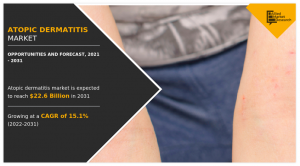Atopic Dermatitis Market to Reach $22.6 Billion by 2031, Driven by Biologics and Technological Advancements
What is Atopic Dermatitis?
Atopic dermatitis (AD) is a chronic inflammatory skin disease characterized by itchiness, dryness, redness, swelling, and cracked skin. It typically begins in childhood but may continue or worsen into adulthood. Although non-contagious, the condition significantly impairs quality of life and increases the risk of secondary infections due to its impact on the skin’s barrier function.
Get a Sample Copy of this Report: https://www.alliedmarketresearch.com/request-sample/3353
According to the American Journal of Managed Care, approximately 15 million Americans were affected by AD in 2017. Notably, 10–20% of infants are diagnosed with this condition, with many showing improvement or outgrowing it by adulthood.
Market Drivers
Several key factors are contributing to the rapid growth of the atopic dermatitis market:
Rising prevalence of atopic diseases worldwide.
Surging demand for biologics and targeted therapies.
Government initiatives to ensure access to affordable and effective treatment.
Increased funding and R&D for dermatology-related innovations.
Technological advancements in teledermatology and remote patient care during the COVID-19 pandemic.
Psychological impact of the disease, such as anxiety and depression, pushing patients to seek more comprehensive care.
Market Restraints and Challenges
Despite significant growth opportunities, the market faces a few obstacles:
High cost of biologic drugs and off-label treatments.
Limited reimbursement policies in developing nations.
Patent expiries and allergic reactions associated with some therapies.
Market Segmentation Insights
✅ By Drug Class:
Biologics dominated the market in 2021 and are projected to maintain leadership due to high efficacy, increased awareness, and rapid uptake in both developed and emerging regions.
Other classes include corticosteroids, calcineurin inhibitors, PDE4 inhibitors, and others.
✅ By Mode of Administration:
The injectable segment held the largest market share in 2021, driven by increased approvals and usage of drugs like Dupixent (dupilumab).
Topical and oral medications are also widely used but lag behind injectables in terms of efficacy and adoption.
✅ By Distribution Channel:
Hospital pharmacies accounted for the largest share in 2021, attributed to increasing prescriptions, rising drug prices, and better access to healthcare infrastructure.
Retail and online pharmacies are also gaining momentum, especially in urban areas.
Regional Outlook
North America remains the dominant region, driven by:
High disease burden.
Early adoption of novel treatments.
Strong reimbursement structures.
As per the National Eczema Association, around 16.5 million adults in the U.S. (7.3%) have AD that began after the age of two.
Asia-Pacific is expected to be the fastest-growing region, owing to:
A large patient pool.
Increasing healthcare investments.
Growing awareness and improved access to dermatological care.
Competitive Landscape
Key players driving innovation in the atopic dermatitis market include:
Sanofi SA
Regeneron Pharmaceuticals, Inc.
Pfizer Inc.
AbbVie Inc.
Eli Lilly and Company
Leo Pharma
Novartis AG
Galderma
Incyte Corporation
Bristol-Myers Squibb
Astellas Pharma
Dermavant Sciences
These companies are focusing on strategic collaborations, clinical trials, and new drug launches to gain a competitive edge and meet rising patient demand.
Conclusion
With rising awareness, technological integration, and rapid advancement in biologics, the global atopic dermatitis market is set for exponential growth. As the burden of chronic skin conditions continues to rise, investment in novel therapies and better patient outreach will remain key to unlocking this market’s full potential.
Enquire Before Buying: https://www.alliedmarketresearch.com/purchase-enquiry/3353
David Correa
Allied Market Research
+ 1800-792-5285
email us here
Visit us on social media:
LinkedIn
Facebook
YouTube
X
Legal Disclaimer:
EIN Presswire provides this news content "as is" without warranty of any kind. We do not accept any responsibility or liability for the accuracy, content, images, videos, licenses, completeness, legality, or reliability of the information contained in this article. If you have any complaints or copyright issues related to this article, kindly contact the author above.
ALLATRA Warns about Anti-Cult Ideology as a Threat to Democracy in Washington, D.C., Marking Falun Gong Persecution
KnitPro Announces the Launch of Karbonz Élan Gift Set for Holiday Season
Global Coffee Beauty Products Market to Reach $1.03 Billion by 2034, Growing at 5.80% CAGR
Więcej ważnych informacji
 Jedynka Newserii
Jedynka Newserii

 Jedynka Newserii
Jedynka Newserii

Konsument

Grupa nowych biednych emerytów stale się powiększa. Ich świadczenie jest znacznie poniżej minimalnej emerytury
Przybywa osób, które z powodu zbyt krótkiego czasu opłacania składek pobierają emeryturę niższą od minimalnej. Tak zwanych nowych biednych emerytów jest w Polsce ok. 430 tys., a zdecydowaną większość grupy stanowią kobiety – wskazują badania ekspertów Instytutu Pracy i Spraw Socjalnych. W ich przypadku krótszy okres składkowy zwykle wynika z konieczności opieki nad dziećmi lub innymi osobami w rodzinie. Wśród innych powodów, wymienianych zarówno przez panie, jak i panów, są także praca za granicą lub na czarno oraz zły stan zdrowia.
Media i PR
M. Wawrykiewicz (PO): Postępowanie z art. 7 przeciw Węgrom pokazało iluzoryczność tej sankcji. Unia wywiera naciski poprzez negocjacje nowego budżetu

Przykład Węgier pokazał, że procedura z artykułu 7 traktatu o UE o łamanie praworządności nie ma mocy prawnej z powodu braku większości, nie mówiąc o jednomyślności wśród pozostałych państw członkowskich. Negocjacje nowego budżetu UE to dobry pretekst do zmiany sposobu części finansowania z pominięciem rządu centralnego. Czerwcowy marsz Pride w Budapeszcie pokazał, że część społeczeństwa, głównie stolica, jest przeciwna rządom Viktora Orbána, ale i na prowincji świadomość konsekwencji działań Fideszu staje się coraz większa przed przyszłorocznymi wyborami.
Firma
Blockchain zmienia rynek pracy i edukacji. Poszukiwane są osoby posiadające wiedzę z różnych dziedzin

Zapotrzebowanie na specjalistów od technologii blockchain dynamicznie rośnie – nie tylko w obszarze IT, ale również w administracji, finansach czy logistyce. Coraz więcej uczelni wprowadza programy związane z rozproszonymi rejestrami, które wyposażają studentów w umiejętności odpowiadające wymogom rynku.
Partner serwisu
Szkolenia

Akademia Newserii
Akademia Newserii to projekt, w ramach którego najlepsi polscy dziennikarze biznesowi, giełdowi oraz lifestylowi, a także szkoleniowcy z wieloletnim doświadczeniem dzielą się swoją wiedzą nt. pracy z mediami.


![Nestlé w Polsce podsumowuje wpływ na krajową gospodarkę. Firma wygenerowała 0,6 proc. polskiego PKB [DEPESZA]](https://www.newseria.pl/files/1097841585/fabryka-nesquik_1,w_85,r_png,_small.png)






.gif)

 |
| |
| |
|